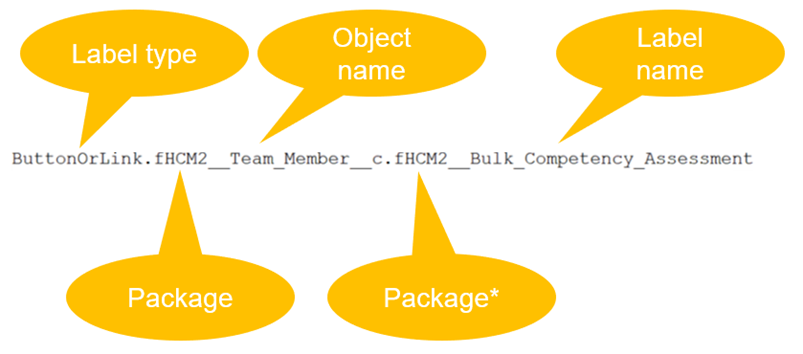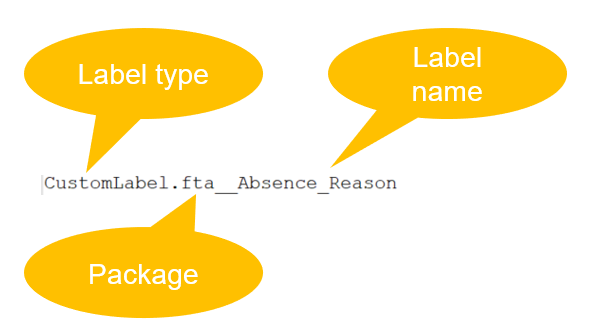Translation files exported from Sage People frequently contain labels not requiring translation, such as brand names or numbers. When Sage People commission translations, we clean the translation files to remove labels we do not want to translate before passing the files to our translators.
In some cases, such as brand names, you can search by value to identify the items you want to remove. In other cases, such as numbers for days in a month, searching by the key or an element in the key is more efficient than searching by value.
The key (in STF files) or ID (in XLIFF files) helps you to understand what the field is and which package it is associated with as shown in these two screenshots:


| Key or ID component | Description |
|---|---|
| Label type |
Labels can be associated with a number of different components, such as:
|
| Package |
The name of the Sage People package the custom object or custom label is associated with. Sage People package namespaces:
Not shown if:
|
| Object name | Name of the custom object. |
| Package* |
If the label is part of a managed package, the package name is repeated here. Not shown if:
|
| Label name | Name of the label. |
At Sage People we remove the following string types from translation files. When you remove labels from STF files, remove entire lines containing labels that do not require translating, and in XLIFF files, remove the entire <trans-unit> segments.
| Type of string | Information and examples |
|---|---|
| Product and brand names |
When the entire label is a product or brand name, remove it from the translation file. There are a small number of labels where Sage People product names are used as part of longer pieces of content needing translation.
|
| Labels for Salesforce standard objects |
Labels for Salesforce standard objects where the object name contains:
Searching for these values in translation files is easier if you search for the object name surrounded by full stops, exactly as they appear in the label key, to avoid finding other labels where these words might occur. |
| Country and region names |
As Sage People uses its own picklists for country and region names, you can remove the Salesforce standard country and region lists from translation files:
Country names are present in a number of Sage People picklists in the translation files:
Depending on the language, country names may be the same in English and the target language. When translating to a language for the first time, leave the country names in the translation file to get the appropriate translations. When you next update translations, the Outdated and untranslated file contains the country names where English and the target language versions are the same, and you can remove those from the file before having it translated. |
| Numbers |
Numbers are present in a number of picklists, including:
A small number of picklists contain some numeric values you can exclude:
|
| Locale codes |
Locale codes are standard, not language specific, and must not be translated. The following picklists contain locale codes:
|
| Single letters |
Default values in job grade picklists are individual letters, which you do not need to translate for languages using the Latin alphabet:
|
| Image Aspect Ratio |
Labels expressing image aspect ratios do not need translating in most cases.
|
| Page and font sizes |
Page sizes and font sizes are expressed with standard labels and do not require translating:
|
| Example values |
Some picklists contain example values you do not need translate:
|
| Technical labels |
A small number of labels hold values and placeholders you must not translate:
|
| Labels associated with deprecated objects |
If custom objects in your system are later deprecated, labels associated with them change to "Deprecated". These labels do not need to be translated as they are not in use. |
| Labels for Sage People developer test data |
|